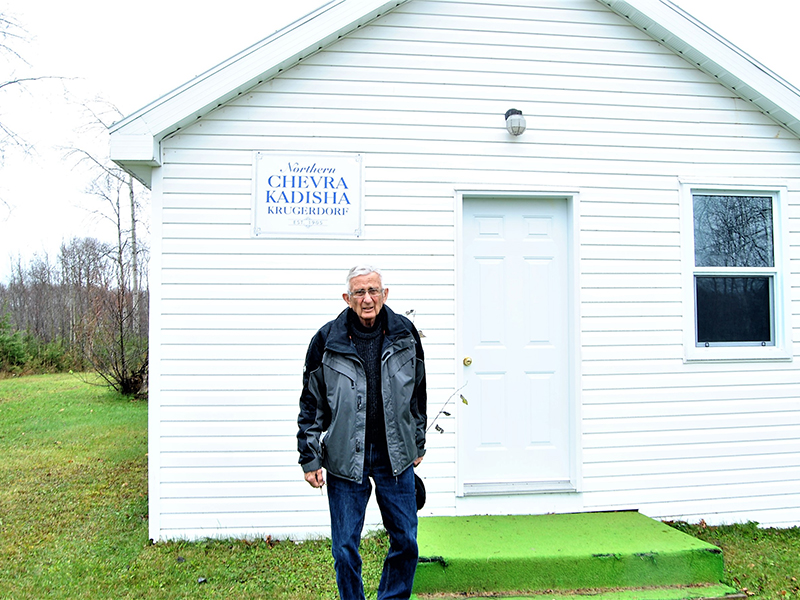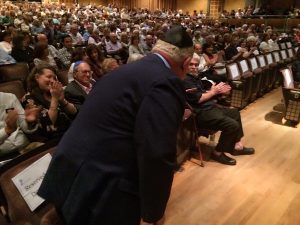Abe Aidelbaum, one of the last remaining Jews in Kirkland Lake, Ont. – just north of Krugerdorf, where a small, 112-year-old Jewish cemetery sits – is working to obtain charitable status for the cemetery, to help maintain it for decades to come.
Aidelbaum, 89, president of the Krugerdorf cemetery, formerly known as the Northern Chevra Kadisha cemetery, explained that the burial ground was founded in 1905, as part of the Krugerdorf settlement, which was sponsored by Baron de Hirsch of Germany.
The Krugerdorf settlement was one of many similar communities in other parts of Canada, the United States, Argentina and Palestine that was founded by de Hirsch, a Jewish philanthropist who funded the Jewish Colonization Association.
“The first interment at Krugerdorf was in 1905,” Aidelbaum said, adding that the first person buried at Krugerdorf was a Jewish railway worker who drowned when the canoe he was steering capsized.
“Simon Henerofsky, a farmer, donated a piece of his land for the first interment. The land was later formally transferred to the Krugerdorf group,” added Aidelbaum.
READ: THE SECRETS OF THE JEWISH CEMETERY OF SESTRORETSK
In 1906, according to the Museum of Northern History, three Jewish men, two of whom were members of the Perkus family – one of the first to settle in Krugerdorf – died after a canoe they were travelling in overturned.
Morris Perkus had canoed to Tomstown, Ont., to pick up family members who had travelled to Canada from the Russian Pale and were arriving by boat on the Blanche River. Three men drowned, and when their bodies were recovered, they were interred on Henerofsky’s property.
Over the years, Jewish settlers were attracted to the area because of gold discoveries in Kirkland Lake and Timmins, Ont., pulp and paper at Iroquois Falls, Ont., and copper mining in Rouyn Noranda, Que.
Aidelbaum’s family came to Kirkland Lake from Montreal during the Great Depression. His father, Saul Aidelbaum, a furniture salesman, later opened a retail store, which Aidelbaum’s late wife, Marianne Kokotow, ran following his father’s death, until 1987.
“I branched off into reforestation,” he said, adding that before he began managing the Krugerdorf cemetery about a decade ago, the post was held by his wife and father-in-law.

Around 100 people are buried in the cemetery, including three of Aidelbaum’s family members – his mother, father and wife.
Over the years, as the Jewish population has continued to decline, so has the number of interments. The last time someone was buried in Krugerdorf was in 2015.
“In Kirkland Lake, we had 100 families, but we are down to four households: two women, both widows, myself, a widower, and a young man. In Timmins, there are only 10 to 15 Jewish households,” Aidelbaum said.
“The challenge we face is putting a funding system in place to replace the diminishing funds,” he explained.
“We want to turn the cemetery into a charitable organization, so we can give charitable receipts for donations. Cemeteries operated by synagogues can issue charitable receipts, but the rules do not permit Krugerdorf cemetery to do so,” he said.
We had 100 families, but we are down to four households.
– Abe Aidelbaum
Aidelbaum researched the struggles of similar cemeteries across Canada. He consulted lawyers and met with Jewish organizations in Toronto.
Krugerdorf cemetery currently sustains itself with the support of Jewish communities in northeastern Ontario and from the descendants of those who have been laid to rest there.
As the Jewish population declines, Krugerdorf cemetery faces even more challenges in the future.
“Maintenance is a big part of it. The grass needs cutting and trimming around the headstones. The old chapel needs maintaining,” said Aidelbaum.
For many, Krugerdorf cemetery serves as a testimony to the courage and strength of the Jewish community that succeeded in the rugged Canadian shield.






